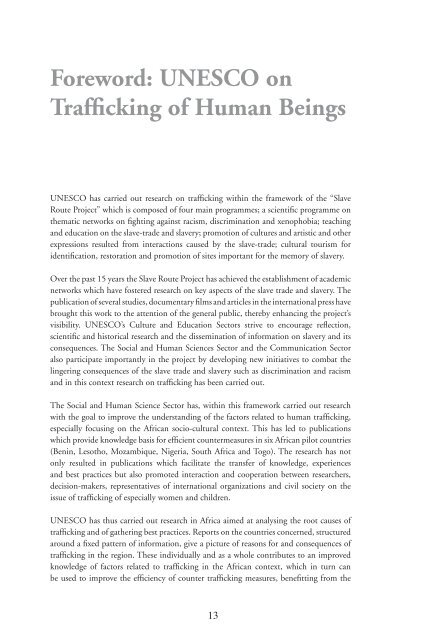Trafficking in human beings: human rights and ... - unesdoc - Unesco
Trafficking in human beings: human rights and ... - unesdoc - Unesco
Trafficking in human beings: human rights and ... - unesdoc - Unesco
Create successful ePaper yourself
Turn your PDF publications into a flip-book with our unique Google optimized e-Paper software.
Foreword: UNESCO on<br />
Traffi ck<strong>in</strong>g of Human Be<strong>in</strong>gs<br />
UNESCO has carried out research on traffi ck<strong>in</strong>g with<strong>in</strong> the framework of the “Slave<br />
Route Project” which is composed of four ma<strong>in</strong> programmes; a scientifi c programme on<br />
thematic networks on fi ght<strong>in</strong>g aga<strong>in</strong>st racism, discrim<strong>in</strong>ation <strong>and</strong> xenophobia; teach<strong>in</strong>g<br />
<strong>and</strong> education on the slave-trade <strong>and</strong> slavery; promotion of cultures <strong>and</strong> artistic <strong>and</strong> other<br />
expressions resulted from <strong>in</strong>teractions caused by the slave-trade; cultural tourism for<br />
identifi cation, restoration <strong>and</strong> promotion of sites important for the memory of slavery.<br />
Over the past 15 years the Slave Route Project has achieved the establishment of academic<br />
networks which have fostered research on key aspects of the slave trade <strong>and</strong> slavery. The<br />
publication of several studies, documentary fi lms <strong>and</strong> articles <strong>in</strong> the <strong>in</strong>ternational press have<br />
brought this work to the attention of the general public, thereby enhanc<strong>in</strong>g the project’s<br />
visibility. UNESCO’s Culture <strong>and</strong> Education Sectors strive to encourage refl ection,<br />
scientifi c <strong>and</strong> historical research <strong>and</strong> the dissem<strong>in</strong>ation of <strong>in</strong>formation on slavery <strong>and</strong> its<br />
consequences. The Social <strong>and</strong> Human Sciences Sector <strong>and</strong> the Communication Sector<br />
also participate importantly <strong>in</strong> the project by develop<strong>in</strong>g new <strong>in</strong>itiatives to combat the<br />
l<strong>in</strong>ger<strong>in</strong>g consequences of the slave trade <strong>and</strong> slavery such as discrim<strong>in</strong>ation <strong>and</strong> racism<br />
<strong>and</strong> <strong>in</strong> this context research on traffi ck<strong>in</strong>g has been carried out.<br />
The Social <strong>and</strong> Human Science Sector has, with<strong>in</strong> this framework carried out research<br />
with the goal to improve the underst<strong>and</strong><strong>in</strong>g of the factors related to <strong>human</strong> traffi ck<strong>in</strong>g,<br />
especially focus<strong>in</strong>g on the African socio-cultural context. This has led to publications<br />
which provide knowledge basis for effi cient countermeasures <strong>in</strong> six African pilot countries<br />
(Ben<strong>in</strong>, Lesotho, Mozambique, Nigeria, South Africa <strong>and</strong> Togo). The research has not<br />
only resulted <strong>in</strong> publications which facilitate the transfer of knowledge, experiences<br />
<strong>and</strong> best practices but also promoted <strong>in</strong>teraction <strong>and</strong> cooperation between researchers,<br />
decision-makers, representatives of <strong>in</strong>ternational organizations <strong>and</strong> civil society on the<br />
issue of traffi ck<strong>in</strong>g of especially women <strong>and</strong> children.<br />
UNESCO has thus carried out research <strong>in</strong> Africa aimed at analys<strong>in</strong>g the root causes of<br />
traffi ck<strong>in</strong>g <strong>and</strong> of gather<strong>in</strong>g best practices. Reports on the countries concerned, structured<br />
around a fi xed pattern of <strong>in</strong>formation, give a picture of reasons for <strong>and</strong> consequences of<br />
traffi ck<strong>in</strong>g <strong>in</strong> the region. These <strong>in</strong>dividually <strong>and</strong> as a whole contributes to an improved<br />
knowledge of factors related to traffi ck<strong>in</strong>g <strong>in</strong> the African context, which <strong>in</strong> turn can<br />
be used to improve the effi ciency of counter traffi ck<strong>in</strong>g measures, benefi tt<strong>in</strong>g from the<br />
13

















